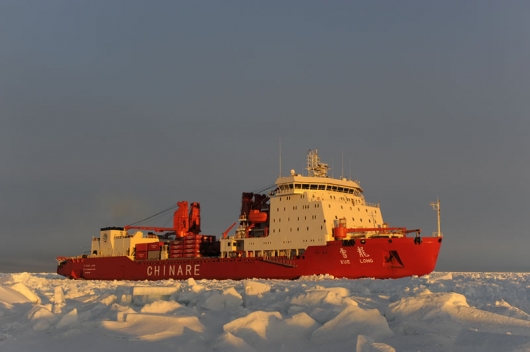 China was the first Asian state to show interest and it has begun efforts to become a full member of the Arctic Council. Beijing argues that under the United Nations Convention on the Law of the Sea the Arctic Ocean is a shipping commons, and that climate change has negative consequences for Chinese food security, particularly with the flooding of its coastal regions. . . .
China was the first Asian state to show interest and it has begun efforts to become a full member of the Arctic Council. Beijing argues that under the United Nations Convention on the Law of the Sea the Arctic Ocean is a shipping commons, and that climate change has negative consequences for Chinese food security, particularly with the flooding of its coastal regions. . . .
At present, China’s Arctic initiatives suggest that Beijing is eager to camouflage its true interests in the region with environmental monitoring, Arctic life protection and concerns about indigenous peoples. Beijing’s rhetoric aims at defining the Arctic as an international zone where changes must make sense for all countries and climate change is a problem for the highest levels of diplomacy. Alongside France and Germany, China sees an oil spill in the Arctic similar to that which occurred in 2010 in the Gulf of Mexico would have disastrous outcomes for global security. So it is spending around $60 million annually on polar research, is building a China-Nordic Arctic Research Center in Shanghai, and plans to increase the research staff by a factor of five, to 1000.
At the same time, Beijing is dropping hints that China is not satisfied with the current balance of power in the Arctic region. The most striking issue in the polemic that represents Beijing’s ambitions in the Arctic race is the identification of China as a “near-Arctic” state. This concept has already become ingrained in the lexicon of Chinese scientists who are responsible for Arctic research. . . .
Beijing seeks a diversification of supply routes. The main route for China – the Strait of Malacca – is susceptible to piracy and terrorism. An Arctic Route would let China, first, reduce transportation expenses, second, diversify and secure its shipments, and third, diminish the risk of a U.S. Navy closure of the Strait in a conflict. Former chairman Hu Jintao was well aware of China’s supply vulnerabilities. According to Chinese analysts, by 2020 between 5 to 15 percent of Chinese foreign trade will be transported through the Northern Sea Route. Experts at the Norwegian transport company Tschudi Shipping Company estimate that the route from Kirkenes or Murmansk to Shanghai will reduce total sailing time by 16 days. . . .
The third element in the Chinese economic strategy in the Arctic is a share of maritime resources, especially fish. The U.S. National Oceanic and Atmospheric Administration has shown the region’s potential in this regard. Access to fisheries is crucial for countries like Greenland and Iceland, which depend heavily on maritime resources for export earnings, and China has been very active in establishing bilateral economic contacts with these smaller members of the Arctic Council to ensure support for its permanent membership bid. These same tactics worked well in the Asia-Pacific, where China built strong investment relations with ASEAN members to help conclude a free trade agreement with ASEAN. In 2010, China provided Iceland with a $500 million-plus currency swap to support the struggling Iceland bank system. Also in 2010, Denmark signed deals with China worth $740 million in the areas of power, the green economy, agriculture and food security. In 2011, Denmark’s ambassador in China made a statement in support of a Chinese bid for permanent membership of the Arctic Council. The same position was expressed by the leaders of Greenland and Iceland. In January 2013, Swedish and even Norwegian (the spat of dissident Liu Xiaobo notwithstanding) representatives on the Arctic Council meeting in Tromsø declared a desire to start the process of discussing China’s role in the Council. . . .
Chinese international strategy in the Arctic will pursue solely pragmatic goals. Not only is economic prosperity as stake but also China’s image as a potential global leader. While it talks up the impact of global warming on Chinese environment and food security, Beijing systematically and purposefully continues to encourage the economic dependence of small Arctic states on China (such as the recent free trade agreement with Iceland) to earn support for a permanent member seat on the Arctic Council. Moreover, the high cost of projects to develop new oil infrastructure in the region force states to attract investors. This opens opportunities for China to develop influence and locks in future energy access. Next up, look for Beijing to begin negotiating route transit fees with Moscow.
Arthur Guschin is a postgraduate student at Saint-Petersburg State University (International Relations Department).
Image: Chinese icebreaker Xuě Lóng (Snow Dragon) (photo: International Polar Foundation)
